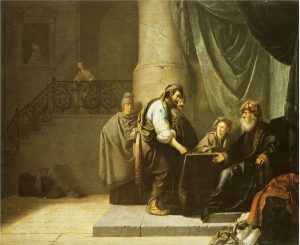Thoughts on Sunday’s Lessons for Nov. 19, 2023 (Pentecost 25A)

The Parable of The Talents. Oil on panel by Willem de Poorter (1608-1668). Narodni Galerie, Prague. (Click image to enlarge.)
First Reading (Track One): Judges 4:1-7
We are nearing the end of the six-month-long season after Pentecost. Next week we celebrate the Reign of Christ Sunday; then Advent begins, and with it a turn to a new Lectionary year centered on the Gospel according to Mark. Our long trek through the ancestral stories of Israel in the Track One first readings comes to an end in the book of Judges. The people have come to live in the promised land. They have fallen into a cycle of behaving badly – “doing what was evil in the sight of the Lord” – then repenting, turning back, and restoring justice under a judge. Amid the patriarchy of the time, it seems remarkable that one of the most noteworthy of the judges was the prophet Deborah, who with God’s help confidently ordered her generals and troops into battle.
First Reading (Track Two): Zephaniah 1:7, 12-18
We have two more weeks until Advent begins, but our Lectionary readings – reflecting an ancient tradition – don’t wait to turn toward Advent themes. SinceAll Saints Day we have begun to hear alarming prophecies and puzzling parables about Judgement Day, waiting for Jesus, and the kingdom of God. In our Track Two first reading, this passage from the minor prophet Zephaniah imagines a horrifying Judgement Day, when all of those who complacently and without humility ignored their duty to be righteous and just will reap what they sowed: A fire of passion that will consume all the earth and all the people in it.
Psalm (Track One): Psalm 123
Subtly but sharply, the Track One readings move from the female judge Deborah to a short, powerful Psalm of worship and praise that quite clearly looks to God in male and female imagery as both master and mistress. In the psalm’s five quick verses we can see inspiration for a theology of liberation, too, in the Psalmist’s call for a preferential option for the poor, in opposition to the contempt shown them by the rich and the proud.
Psalm (Track Two): Psalm 90:1-8, (9-11), 12
Our time is nothing like God’s time, the Psalmist sings. While we see a thousand years slowly pass, generation after generation, it all goes by in a moment for God, who remains from age to age, present before the mountains, the land, and the Earth were born. Our lives, in contrast, “pass away quickly and we are gone,” like grass that dries up in a day in the desert heat. We pray with the Psalmist that God may help us learn to make wise use of our time.
Second Reading: 1 Thessalonians 5:1-11
Wrapping up his short first letter to the people of Thessalonika, Paul tells them that the day of the Lord is coming and urges them to be prepared. Using colorful metaphors – a thief coming in the night, a woman surprised by sudden labor pains – he warns that the last day will come suddenly and by surprise. Be faithful, he says; be loving. Don’t spend the night drunk, but live in the day, sober and watchful. Continue to care for one another, encourage each other, build each other up, he urges, “as indeed you are doing.”
Gospel: Matthew 25:14-30
Sunday we hear yet another troubling parable from Matthew’s Gospel. Let’s not be tempted to read this as a proclamation of the so-called prosperity gospel: Surely Jesus is not teaching his followers to invest their goods and watch them grow. Rather, he challenges them to model on their Master, making use of all that God has given them for the sake of the kingdom. Then, turn a page ahead and see what comes next in this series of parables about waiting for Christ’s return: The last judgement, when Christ will look for those who saw the face of Jesus in the hungry, the thirsty, the oppressed, sick persons and prisoners. In this passage hear that we, like the first two slaves, will take risks and give of ourselves abundantly, that we may enter into the joy of our master.
